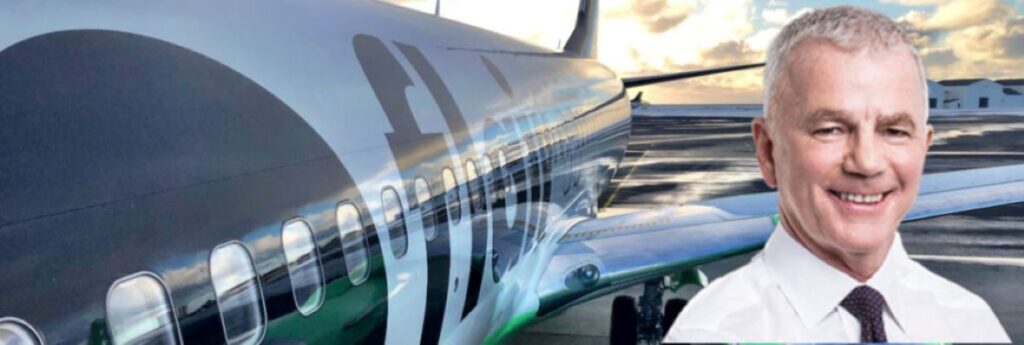Not all of the Canadian airlines currently jockeying for position in a crowded market are likely to survive in the long-term, says the CEO of Edmonton-based Flair Airlines. Stephen Jones made the comments at the Calgary International Airport on Tuesday, where discount carrier Flair is establishing a new base of operations as part of its ongoing aggressive expansion plans.
The company, which had just three aircraft at the start of 2021, will have a total fleet of 21 Boeing 737s by this summer with service to over 30 cities across Canada, the US and Mexico.
“I think there will be churn. I don’t think every airline is going to succeed and grow,” said Jones in an interview. “The trick I think will be picking a lane. Air Canada’s clearly got the top of it (the market), we’re clearly going for the bottom.
I think the harder questions are for the airlines in the middle.”
The last few years have seen a surge of new Canadian airlines, including Edmonton-based Flair, Lynx, and Canada Jetlines, while established carriers such as Porter Airlines are expanding aggressively.
Most of the new airlines are gunning to dominate the low-cost carrier model, which offers cheap base fares and then requires passengers to pay extra for add-ons such as checked bags, cancellations and changes, and seat selection.
Jones said in other parts of the world, the low-cost carrier model dominates the leisure travel market, and he said he expects in time that will be the case in Canada.
“I think there will be a significant low-class carrier dominating leisure travel 10 years from now. Our plan is for that to be Flair Airlines, but others have seen the same opportunity and they compete with us,” he said.
One of those airlines “in the middle,” which Jones suggested could be challenged to find its niche in future, is Canada’s No. 2 airline, WestJet.
By expanding in Calgary, Flair – says it will employ nearly 150 people out of its Calgary base and offer 15 routes out of the city by this fall – is taking on WestJet in its own backyard. In fact, earlier this year WestJet announced a new strategic plan which will see the airline refocus on Western Canada, adding routes to and from Calgary and other Western cities and making Calgary the central hub for international flights using its wide-body 787 Dreamliner fleet.
When asked if Flair is trying to capture the market space that WestJet occupied in its early days, Jones said WestJet is in “transition.” When WestJet launched in 1996, it aimed to emulate the successful low-cost model of Southwest Airlines, but the Calgary-based company has grown and expanded significantly since then – adding aircraft types, long-haul flying, and different fare categories.
“I guess what I would say is they had a much more clear proposition back then than they have now,” Jones said. “Whereas we’re much clearer on who we are and why we’re here. We’re not interested in inter-line, we’re not interested in flights to Europe, or cargo… That clarity makes things easier.”
Jones also cast doubt on WestJet Airlines’ purchase of Sunwing’s main airline and vacation divisions, which became official Monday.
“Acquisitions and mergers in the airline industry are notoriously hard to implement,” he said. “`I think it will be a little bit hard (for WestJet) to digest, as you’ve got different cultures, different pilot unions, and they’re notoriously hard to merge smoothly.”
In an emailed statement Tuesday, WestJet spokeswoman Madison Kruger said the airline believes in the value of competition, as “airlines with a strong foundation and business model” are essential to ensuring the longevity of the Canadian travel industry.
“We are confident in our new strategic direction that is rooted in providing friendly, reliable and affordable air travel to Canadians,” Kruger wrote.
Jones’ comments come as airlines and the travelling public are gearing up for the summer season, which is expected to be a busy one. He said Flair’s summer bookings are up 30% year-over-year, and already in the month of April the airline was flying planes that were 90%.
This is occurring at the same time that the Canadian Transportation Agency is dealing with a backlog of complaints from passengers who suffered flight disruptions, cancellations, and general airport chaos last summer, as the Canadian aviation industry struggled to ramp up in the face of surging demand following the lifting of COVID-19 public health restrictions.
Flair was also forced to cancel multiple flights earlier this spring when four of its aircraft were seized by lessor Airborne Capital, which alleged that Flair fell behind in its payments.
Jones acknowledged that what happened last summer was a “meltdown” for the entire aviation system, from airlines to airports to border services agencies. He said that Canadians planning summer travel this year should rest assured that their experience in 2023 will be better.
“I look at our own performance just now, our on-time performance – it’s markedly better than it was last year. And I think the government services are all staffed up as well,” he said.
“This summer, I’m sure there will be some disruptions, but it’s going to be completely different than last year.”
Related articles:
Flair compensation frustration.
https://travelindustrytoday.com/flair-compensation-frustration/
The gloves are off.
Not naming names.

